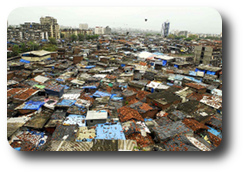Sunday 1 November, 12.30pm until 1.30pm, Courtyard Gallery Lunchtime Debates
 While India is showing signs of economic dynamism, its development is not without problems. Cities like Bangalore and Mumbai are implementing slum clearance, decanting large numbers of people into newly-built homes, a process involving costly infrastructure development as well as causing unrest. Some condemn this as gentrification; others argue the city should develop organically; still others suggest if it ain’t broke, why fix it? National Geographic explored Dharavi, the massive slum at the heart of Mumbai, and found ‘once you get accustomed to sharing 300 square feet of floor with 15 humans and an uncounted number of mice, a strange sense of relaxation sets in’. Following the success of Slumdog Millionaire, slum tourism has taken off, with highlights including gawping at a stall of six toilets serving 16,000 people.
While India is showing signs of economic dynamism, its development is not without problems. Cities like Bangalore and Mumbai are implementing slum clearance, decanting large numbers of people into newly-built homes, a process involving costly infrastructure development as well as causing unrest. Some condemn this as gentrification; others argue the city should develop organically; still others suggest if it ain’t broke, why fix it? National Geographic explored Dharavi, the massive slum at the heart of Mumbai, and found ‘once you get accustomed to sharing 300 square feet of floor with 15 humans and an uncounted number of mice, a strange sense of relaxation sets in’. Following the success of Slumdog Millionaire, slum tourism has taken off, with highlights including gawping at a stall of six toilets serving 16,000 people.
Urban strategist Jeb Brugman says negative views of the slums reflect ‘a Raj or British period mentality’. For him, slums are centres of creativity and dynamism; necessary precursors to development. Indeed, the slum economy provides a sixth of India’s GDP, and slum-dwelling is no barrier to economic development. With the new Four Seasons hotel towering over the nearby shanty-towns, and land prices in Mumbai reaching record levels, change is certainly underway in Dharavi, but the contradictions of the Maximum City are clear, with bosses in luxury on one side of the road and slum-dwellers facing them in squalor.
In his best-selling book Imagining India: Ideas For A New Century, IT entrepreneur Nandan Nilekani notes ‘with a factory worker costing 80 per cent lower than averages in developed markets, India can become the next big source of manufacturing labour in the world’. So is India creating a society of equals, or relying on inequality and cheap labour to survive? Speaking symbolically of India’s relationship with the world, as well as its internal difficulties, Deepak Chopra echoes Aravind Adiga and asks whether ‘the slumdogs will one day rise up against the millionaires’. Will economic development raise the standards of living of the poorest in society or merely exacerbate income disparities? And is this merely an unfortunate but necessary stage of economic and social development that is nobody’s business but India’s?
Listen to the session audio…
Other formats are available here
 | Parminder Bahra poverty and development correspondent, The Times |
 | Professor Stuart Corbridge head, Development Studies Institute, LSE; co-author, Seeing the State: governance and governmentality in India |
 | Dr Sunand Prasad senior partner, Penoyre & Prasad LLP; immediate past president, RIBA |
| Chair: | |

|
Austin Williams
associate professor in architecture, XJTLU University, Suzhou, China; director, Future Cities Project; convenor, Bookshop Barnies; founding member of New Narratives |
Save the Children says state-run health system is failing to give skilled care to poor.
Gethin Chamberlain, Observer, 4 October 2009Westerners need to scratch beyond the surface of the films and superficial criticism. They need to see the real stories of heartbreak, innovation, and perseverance that make these harsh and unbending slums potential incubators of economic dynamism.
Samuel R Stanley, New Geography, 4 June 2009The popular, strong and stable government in Delhi raises the expectations of disaster victims and vulnerable households across India. Am Admi and Am Aurat expects progressive policies and firm decisions.
Mihir R Bhatt, Economic Times (India), 31 May 2009
 Nilekani reveals why India's huge population has now become her greatest strength; how information technology is bringing the benefits of globalization; why rapid urbanization is transforming social and political life; and how we can learn from India's difficult journey towards a single internal market.
Nilekani reveals why India's huge population has now become her greatest strength; how information technology is bringing the benefits of globalization; why rapid urbanization is transforming social and political life; and how we can learn from India's difficult journey towards a single internal market.
Nandan Nilekani, Allen Lane, 30 April 2009
Isolated from world trends, India's aspiring middle will help it grow through the credit storm
Jason Overdorf, Newsweek, 14 February 2009The poor get a home in a block in a prime location, the companies make money and Mumbai's residents get a posh new city quarter. Theoretically at least, everyone wins.
Mukul Devichand, BBC News, 14 August 2008The World Bank claims that poverty in Asia has been halved between 1990 and 2003. But the story looks good only until you see the underbelly of this economic growth – growing inequality, violence and pollution.
John Samuel, infochange, April 2008